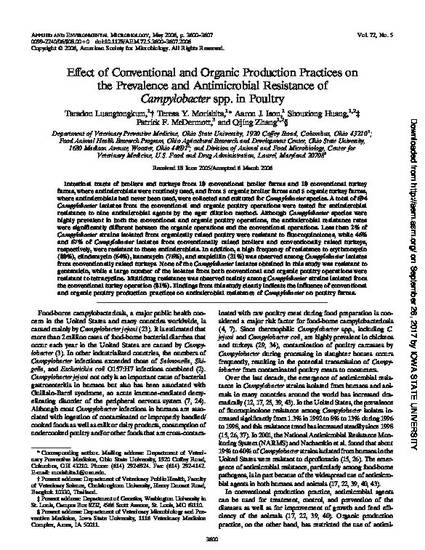
Article
Effect of Conventional and Organic Production Practices on the Prevalence and Antimicrobial Resistance of Campylobacter spp. in Poultry
Applied and Environmental Microbiology
(2006)
Abstract
Intestinal tracts of broilers and turkeys from 10 conventional broiler farms and 10 conventional turkey farms, where antimicrobials were routinely used, and from 5 organic broiler farms and 5 organic turkey farms, where antimicrobials had never been used, were collected and cultured for Campylobacter species. A total of 694 Campylobacter isolates from the conventional and organic poultry operations were tested for antimicrobial resistance to nine antimicrobial agents by the agar dilution method. Although Campylobacter species were highly prevalent in both the conventional and organic poultry operations, the antimicrobial resistance rates were significantly different between the organic operations and the conventional operations. Less than 2% of Campylobacter strains isolated from organically raised poultry were resistant to fluoroquinolones, while 46% and 67% of Campylobacter isolates from conventionally raised broilers and conventionally raised turkeys, respectively, were resistant to these antimicrobials. In addition, a high frequency of resistance to erythromycin (80%), clindamycin (64%), kanamycin (76%), and ampicillin (31%) was observed among Campylobacter isolates from conventionally raised turkeys. None of the Campylobacter isolates obtained in this study was resistant to gentamicin, while a large number of the isolates from both conventional and organic poultry operations were resistant to tetracycline. Multidrug resistance was observed mainly among Campylobacter strains isolated from the conventional turkey operation (81%). Findings from this study clearly indicate the influence of conventional and organic poultry production practices on antimicrobial resistance of Campylobacter on poultry farms.
Disciplines
Publication Date
May, 2006
DOI
10.1128/AEM.72.5.3600-3607.2006
Publisher Statement
Works produced by employees of the U.S. Government as part of their official duties are not copyrighted within the U.S. The content of this document is not copyrighted.
Citation Information
Taradon Luangtongkum, Teresa Y. Morishita, Aaron J. Ison, Shouxiong Huang, et al.. "Effect of Conventional and Organic Production Practices on the Prevalence and Antimicrobial Resistance of Campylobacter spp. in Poultry" Applied and Environmental Microbiology Vol. 72 Iss. 5 (2006) p. 3600 - 3607 Available at: http://works.bepress.com/qijing-zhang/24/
